Denial is an earnest and refreshing reminder that facts matter. At a time when social media provides a platform for conspiracy theories, and racist interpretations migrate from the dark Internet to mainstream media, this meticulous courtroom drama relieves tensions by reenacting a real-life challenge to a prominent Holocaust denier.
The danger that David Irving (Timothy Spall) posed is briefly seen when the British writer theatrically fans neo-Nazi support in the United States, amusing a Tampa audience in 1992 with anti-Semitic jokes about Auschwitz and disrupting a 1994 lecture in Georgia by Deborah E. Lipstadt (Rachel Weisz) after she had refused to “debate” the Holocaust with him on C-SPAN. In both appearances, he accuses Jews of financially and politically benefiting from a myth.
In her 1993 book Denying the Holocaust: The Growing Assault on Truth and Memory, she called him, “one of the most dangerous spokespersons for Holocaust denial,” because his research was colored by his support for Adolf Hitler. (Reputable publishers issued his books that were favorably reviewed by recognized experts on World War II.) When her book was published in England in 1995, Irving sued Lipstadt and her publisher for libel, claiming his reputation and livelihood had been hurt by her false accusations.
Her dander up (Weisz’s reddish wig seems to get nattier when she conveys annoyance), she leaves her academic roost as a professor of modern Jewish and Holocaust studies at Emory University in Atlanta for England to get a lesson in British jurisprudence. She is first recommended to a solicitor, Anthony Julius (a coolly stolid Andrew Scott), who will shape the legal strategy outside the courtroom.
Julius’s tabloid reputation precedes him, as he successfully took on the royal family on behalf of Princess Diana. Lipstadt expects the U.S. standard of innocent until proven guilty, but he schools her that in libel cases in England, the burden of proof will be on her, the defendant. He introduces her to her courtroom litigator, barrister Richard Rampton (the ever sharp Tom Wilkinson), who explains they will need to prove her statements were “substantially true.”
Both of her lawyers insist, to her great frustration, that she won’t be testifying and cannot speak to the press, so her only public statements about Irving will be what she wrote in her book. This also means that the press knows none of the behind-the-scenes strategizing as it avidly covers the case during its three years of preparation and four months in court. Meanwhile, Irving, who represents himself, feeds it catchy headlines. The lawyers manage to convince Irving that he is better off having the “complicated” case heard by only a judge, the scrupulously fair Sir Charles Gray (Alex Jennings), and not a jury, which minimizes his propaganda opportunities
In a very moving scene as they prepare their case, the legal team and an architectural historian visit “the scene of the crime,” Auschwitz-Birkenau, filmed on-location. (The prosecution in Verdict On Auschwitz: The Frankfurt Auschwitz Trial 1963-1965 did so, too, actually bringing the judges there to effectively counter claims by Nazi defendants as to what happened there.)
Yet in a personally crushing development for the emotional Lipstadt, they will not call Holocaust survivors as witnesses, even as survivors (represented by Harriet Walker’s elderly character) plead privately with her for the chance. On the other hand, British Jews don’t want anyone to rock their comfortable boat, and they pressure her to drop the case as if she has instigated it, leaving her to turn to American Jews to finance her defense team. (Irving turns Steven Spielberg’s support into a cause célèbre.)
Screenwriter David Hare, in adapting Lipstadt’s journal of these events, picks out what to emphasize out of the 32 days in court: that the Holocaust occurred, that Irving was a Holocaust denier and Hitler apologist, and that he had deliberately manipulated facts to support his own ideological views. While Hare leaves out the British historians who defended Irving’s books on Nazi generals and Hitler, he includes Rampton’s puncturing of Irving’s reputation for flawless German translation of archival sources. (Rampton had learned German to do so.) He pinpoints a key mistranslated message from Hitler about one spared train of Jews that was part of the revision of Irving’s Hitler biography. It claimed that the Fuhrer did not know about the Final Solution.
The most dramatic courtroom scenes challenge Irving’s various assertions that the gas chambers at Auschwitz were not for extermination at all, let alone for killing more than a million people. (Some documentation of Auschwitz as an extermination camp has evidently come to light from Soviet archives.)
Hare nobly resists the temptation to make too much of the attractive young legal assistants. They mostly discuss how proud they are to work on this case. Director Mick Jackson reduces Lipstadt’s personal life to her nightly jogs around London, during which she is inspired by a huge bronze statue of the Celtic warrior queen Boadicea repelling Roman invaders.
Though it doesn’t rise to the level of such classic Holocaust trial-related films as Stanley Kramer’s Oscar-winning Judgment at Nuremberg (1961) or the Emmy-winning adaptation of Leon Uris’s novel QB VII (1974), Denial is as satisfying as it is vexing regarding what it took to challenge just one prominent denier.
This year, on the United Nations’ Holocaust Remembrance Day, Iranian Supreme Leader Ali Khamenei issued a video questioning the Holocaust that cited Irving. Lipstadt has noted that the transcript of her trial is being posted by Emory University in several languages, including Farsi, for his convenience.

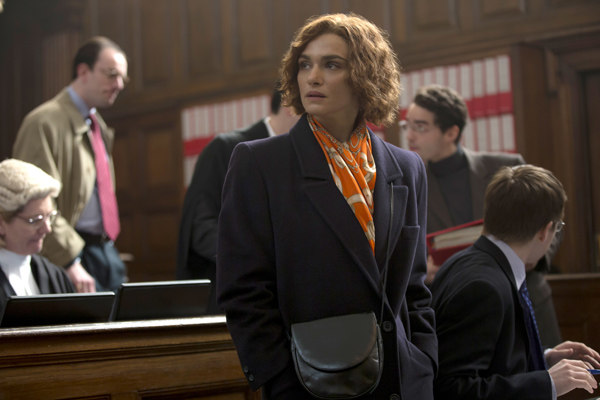
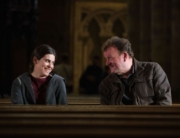
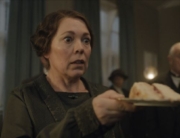
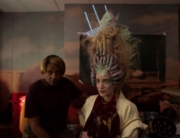

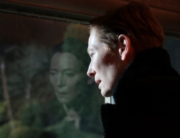
Leave A Comment